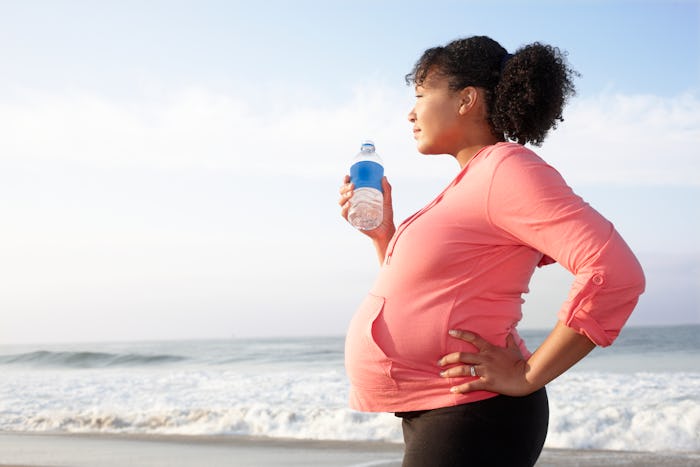Life

Doing everything you're "supposed to do" when you're pregnant can feel like a full-time job. Helping your body grow a human isn't easy, but there's one task that arguably sits at the top of the "must do" list: drink water. It's widely known that not drinking enough water, pregnant or not, can cause dehydration. The symptoms and effects of dehydration vary from person to person, but the toll it takes on pregnant women is especially concerning. So what happens if you don't drink enough water during pregnancy? Perhaps even more importantly, what can be done about it?
First, how much water are you actually supposed to be drinking when you’re pregnant?. “I advise my patients to drink one liter of water before noon and one liter before bed for a total of two liters per day [or, around 68 ounces],” Certified Nurse Midwife Jana Flesher tells Romper. That might seem like way more than you can handle, but just keep a water bottle nearby at all times and take little sips throughout the day. If you’re one of the unlucky moms who develops a mild aversion to water, you can help yourself stay hydrated by drinking “milk or a non-dairy nut beverage, like almond milk, [and] broths are excellent,” says Flesher. And maybe skip the ice cold stuff. “Warm or room temperature beverages actually hydrate the body more quickly,” Flesher says. “A cup of hot water with fresh-squeezed lemon, honey, and some grated ginger as an initial morning beverage can hydrate, settle nausea, and assist in moving bowels.” Foods that have naturally high water content (like watermelon, cucumbers, and iceberg lettuce) can help you to stay hydrated too, according to the Cleveland Clinic. It’s a great excuse to lie around like Cleopatra all day while being fed strawberries (also on the list of foods with high water content).
Joking aside, the effects of not drinking enough water while pregnant vary from woman to woman and some are very serious. It's important to be made aware of the potential complications associated with dehydration so it can either be avoided altogether, or early and potentially life-saving intervention can occur. So, with that in mind, here are seven things that could happen if you don't drink enough water while pregnant.
1
You Could Experience Maternal Overheating
Maternal overheating is a sign of dehydration, and as explained on Healthline, if you're not drinking enough water your body could have a hard time regulating heat. Overheating can also happen if a pregnant woman is in a hot tub or sauna (which is why pregnant woman are encouraged to avoid them). According to the Mayo Clinic, maternal overheating is thought to cause neural tube defects in babies, so it's imperative that pregnant women avoid getting too hot.
2
You Might Get A Wicked Headache
Dehydration in anyone, pregnant or not, is thought to be a trigger for headaches and migraines, according to Very Well. It's not entirely clear what the connection is, exactly, but some studies have shown the blood vessels in the head may narrow when attempting to regulate fluids. This would also make it harder for oxygen and blood to get to the brain, resulting in a headache.
3
You'll Be Moody AF
Okay, so you're probably a little bit more moody in general these days. But losing your cool could actually mean you're not hydrated. A 2012 study published in the Journal of Nutrition found that even a little dehydration can alter a person's mood, energy levels, and mental abilities (which maybe explains a lot).
4
You Might Feel Really Dizzy
Being off balance while pregnant is pretty much the norm, but according to Flesher, dizziness can a possible sign of dehydration. She says, “in the first and second trimesters, dehydration can cause lower blood pressure, which in turn can cause a woman to feel faint or light-headed.” Not only that, but you may also experience “nausea, fatigue, headaches, [and] constipation.” If you’re feeling dizzy and faint, make sure you stop, sit down, and drink a glass of cold water.
5
Amniotic Fluid May Decrease
The amniotic sac helps protect your baby and aids in the development of muscles, limbs, lungs, and the digestive system, so you want to do whatever you can to keep it full of fluid. While a study from the Journal of Ultrasound in Medicine found that a woman’s fluid intake isn’t the primary driver for amniotic fluid volume, Flesher explains that “dehydration can contribute to lower amniotic fluid levels later in pregnancy.”
6
You Have Increased Risk Of Pre-Term Contractions
I became dehydrated one day during my first pregnancy because I was walking around all day in the heat (and clearly not drinking enough water). That night, while I was in bed, I had what felt like Braxton Hicks, but stronger and more intense. I was admitted to the hospital and doctors told me that I was likely dehydrated which resulted in pre-term contractions, which is pretty scary. Turns out, dehydration can actually cause pre-term labor in some pregnant women, as noted on Healthline.
Bottom line, drink water. It's better to pee a bazillion times than the alternative.
7
Inadequate Breast Milk Production
It's probably not a surprise that you need a sufficient amount of water in your body to make breast milk. As Healthline reported, being dehydrated can cause pregnant women to have poor milk production. If you're planning to breastfeed your baby, you'd be wise to guzzle some water.
It may be a challenge regulating your fluids, especially during the summer months, but it can be done. And remember, the easiest thing a pregnant woman could do to make sure she's getting enough water is to bring a large, refillable water bottle with her everywhere she goes.
Experts:
This article was originally published on